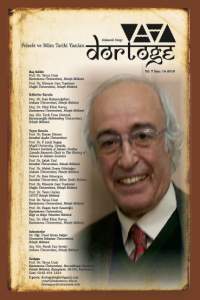Öz
Makale alfabenin doğuşunu çizgi ve sınır kavramları üzerinden görsel ve işitsel bağlamda araştırma amacı taşır. Bu amaçla çizgiyi bir kavram olarak ele alıp onun çizme eyleminde ortaya çıkan izinin sembolik anlamını araştırarak temsil ve taklit kavramlarına ulaşır. Sembolik olanın kavram ve görüyü bir araya getiren yapısında iç ve dış bağlamına oturan çizgi böylece aynı zamanda da geçici ve kalıcı ayrımında ölümsüzlük arzusunun bir ifadesi olarak ele alınır. Ardından çizgi ve biçim ilişkisindeki çizginin biçime bürünmesini aktörün sanatıyla karşılaştıran metin, dilin sahne özelliğini ortaya koyar. Sonuç bölümünde ise alfabenin doğuşu çeşitli tarihsel dönemler ve kategoriler içinde ele alınarak ses ve görüntü bağlamında dilin sembolik yapısına dikkat çekilir.
Kaynakça
- Cassirer, Ernst (1965). Philosophy of Symbolic Forms, trans. by Ralph Manheim, Yale University Press.
- Guthrie, W. K. C. (1962-81). A History of Greek Philosophy, 6 vols., Cambridge: Cambridge University Press.
- Kant, Immanuel (1999). Critique of Pure Reason, ed. & trans. by Paul Guyer & Allen W. Wood, Cambridge: Cambridge University Press.
- Kirk, G. S.; Raven, J. E. & M. Schofield (1983). The Presocratic Philosophers. A Critical History with a Selection of Texts, 2nd Edition, Cambridge: Cambridge University Press.
- Liddell, Henry George & Robert Scott (1940). A Greek-English Lexicon, revised and augmented throughout by Sir Henry Stuart Jones, with the assistance of Roderick McKenzie, Oxford: Clarendon Press.
- Naveh, Joseph (2005). Early History of Alphabet, Warda Books.
- Plato (1900/1907). Platonis Opera, 5 vols., Ed. John Burnet, Oxford: Clarendon Press.
- Plato (1997). Complete Works, ed., with introduction and notes, by John M. Cooper, associate ed. D. S. Hutchinson, Hackett Publishing.
- Ramazanoğlu, Muzaffer (1998). Gılgamış Destanı, çev. ve yay. haz. Muzaffer Ramazanoğlu, İstanbul: Cumhuriyet Dünya Klasikleri.
Öz
Present essay is intended to investigate the birth of alphabet in view of the concepts of line and limit within the audio-visual context. Within this frame, mimesis and representation come to fore as a result of investigating the symbolic meaning of line as a visualised concept in a trace. As such the line not only serves a representation of an outward form of an object but also bears a becoming of the inward subject in a mimetic sense. Afterwards comparing the draughtsmanship in its transformation of line into a form with the art of actorship when actor transforms the very self into a role without identification as such, the essay arrives at the idea of ‘setting a stage’ within language. In the final part the birth of alphabet is taken up in different historical context and categories and the symbolical structure of language is emphasised
Kaynakça
- Cassirer, Ernst (1965). Philosophy of Symbolic Forms, trans. by Ralph Manheim, Yale University Press.
- Guthrie, W. K. C. (1962-81). A History of Greek Philosophy, 6 vols., Cambridge: Cambridge University Press.
- Kant, Immanuel (1999). Critique of Pure Reason, ed. & trans. by Paul Guyer & Allen W. Wood, Cambridge: Cambridge University Press.
- Kirk, G. S.; Raven, J. E. & M. Schofield (1983). The Presocratic Philosophers. A Critical History with a Selection of Texts, 2nd Edition, Cambridge: Cambridge University Press.
- Liddell, Henry George & Robert Scott (1940). A Greek-English Lexicon, revised and augmented throughout by Sir Henry Stuart Jones, with the assistance of Roderick McKenzie, Oxford: Clarendon Press.
- Naveh, Joseph (2005). Early History of Alphabet, Warda Books.
- Plato (1900/1907). Platonis Opera, 5 vols., Ed. John Burnet, Oxford: Clarendon Press.
- Plato (1997). Complete Works, ed., with introduction and notes, by John M. Cooper, associate ed. D. S. Hutchinson, Hackett Publishing.
- Ramazanoğlu, Muzaffer (1998). Gılgamış Destanı, çev. ve yay. haz. Muzaffer Ramazanoğlu, İstanbul: Cumhuriyet Dünya Klasikleri.
Ayrıntılar
| Birincil Dil | Türkçe |
|---|---|
| Bölüm | Araştırma Makalesi |
| Yazarlar | |
| Yayımlanma Tarihi | 14 Aralık 2018 |
| Gönderilme Tarihi | 7 Ekim 2018 |
| Yayımlandığı Sayı | Yıl 2018 Sayı: 14 |


